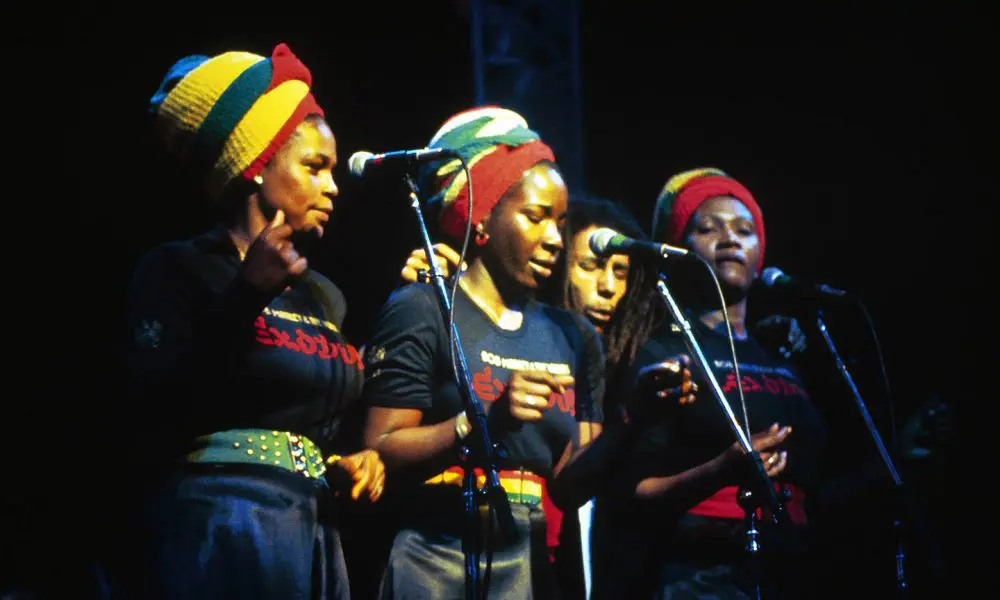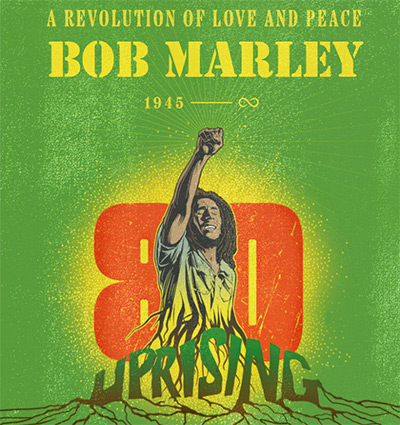Who Were The I-Threes? Revealing The Powerful, Unique Voices Behind Marley’s Music
Individually and collectively, The I-Threes were a powerful and unique unit that helped lift Bob Marley’s music even higher.

The female backing singing group is not uncommon. From the yé-yé girls in French pop to The Ladybirds eternally doing sessions in the UK – unseen but gaining credits on Top Of The Pops – to Ray Charles’ Raelettes and the terrifyingly talented female singers that made up part of Stevie Wonder’s Wonderlove band, they have been part of the DNA of 50s, 60s and 70s music, and linger still. But few backing vocal groups had as strong a pedigree as Bob Marley’s trio of confirmation vocalists, The I-Threes.
The I-Threes became an official part of Bob Marley’s organization in 1974. Their inclusion came in the wake of the break-up of The Wailers – a vocal group comprising Marley, Peter Tosh, and Bunny Wailer. Tosh and Wailer had quit the group, feeling that they were being sidelined while Bob was being groomed for rock stardom at their expense. So Bob recruited his wife, Rita, who had been singing with The Wailers for the best part of a decade, along with Judy Mowatt and Marcia Griffiths, to form The I-Threes. Their role was to sweeten and emphasize the message in the songs. From the start, they gave Marley’s music a totally different tone, such as on “Talkin’ Blues,” from Natty Dread, the first album Bob made alongside The I-Threes.
Rita Marley, formerly Rita Anderson, had been making records since 1964, starting her career at Studio One, the record company where Bob and The Wailers had first made a name for themselves. She sung duets with Bunny Wailer as Bunny/Bonnie & Rita, duetted with Peter Tosh, and sang lead in a group, The Soulettes, which recorded extensively in the mid-60s and sang on records by Jamaican soul vocalist Tony Gregory and saucy ska singles by Lee Perry.
As a solo artist, Rita came close to having a UK hit in 1966 with a cool ska take of The Changin’ Times/Crispian St Peters’ smash “Pied Piper” and cut a fine version of Nancy Ames’ “Friends And Lovers Forever.” By 1968, she was part of The Wailers’ venture with US chart act Johnny Nash and JAD Records, and cut a rocksteady version of Bob Marley’s “Bend Down Low” under the credit of Bob, Rita & Peter. Like her husband (she’d married Bob in 1966), she was produced by Lee Perry in the early 70s, offering a version of The Beatles’ “Let It Be,” along with the funky “Bring It Up” and “This World,” and there had been numerous other releases between 1965 and the formation of The I-Threes.
Marcia Griffiths’ career path was similar, except a different Bob wrote songs for her, and she had enjoyed more global fame than Rita before joining The I-Threes. Marcia was a rather more forceful solo voice. In the mid-60s she issued a handful of singles for Studio One, including the ballad “Funny,” but really found her feet in 1967 with a Bob Andy song, “Melody Life,” and hit again in Jamaica with “Feel Like Jumping” the following year. Both tunes still play in reggae dances today as if they are contemporary records. In the kind of strange coincidence reggae throws up, Rita Marley’s “Come To Me” was released in the UK on the Coxsone label, credited to Marcia.
An artistic partnership with Bob Andy, as Bob & Marcia, delivered global fame for Marcia in 1970 with an entrancing orchestrated version of “Young, Gifted And Black,” and, in another coincidence, their follow-up hit was an interpretation of “Pied Piper.” She also cut versions of “Band Of Gold” and “Put A Little Love In Your Heart,” which are fondly remembered by reggae fans. At the time she joined The I-Threes, Marcia was enjoying a reggae hit with “Sweet Bitter Love” and about to embark on a fruitful association with the producer Sonia Pottinger, which yielded “Dreamland.”
The lead voice of The Gaylettes, Judy Mowatt found local fame when that group cut a couple of Jamaican hits for the Merritone label during the rocksteady era. “I Like Your World” and “Silent River Runs Deep” were excellent records, with Mowatt’s cool but soulful, clearly youthful voice fronting them well. She too found herself singing back-up to some Lee Perry rudeness, which she later admitted she found deeply embarrassing, but further singles in 1970 and 1971 were more her style: a version of Dusty Springfield’s “Son Of A Preacher Man,” and the gutsy roots song “The Gardener,” credited to Jullian on a Jamaican single and something of a cult item among collectors. The singles “Rescue Me” and “Emergency Call” kept her in the reggae public’s eye in 1973, as did a cut of Bob Marley’s “Mellow Mood,” released on his Tuff Gong imprint.
So all three singers had strong connections with Marley before joining The I-Threes, but joining the Marley enterprise conferred certain advantages. When it came to international success for a Jamaican artist, his was almost the only show in town in 1974. Reggae remained a club phenomenon outside of Jamaica, but it was clear that Marley, with Island Records’ considerable promotional muscle and a rising reputation with the rock audience, was about to play huge shows worldwide. Even if you had a massive hit in Jamaica, you were not guaranteed to earn a penny in royalties; Marley’s tours, however, offered a steady, decent income – something almost unheard of in 70s reggae.
Plus, The I-Threes were not anonymous backing talents. The first two singles they worked on with Bob, “Belly Full” and “Knotty Dread,” were credited to The I-Threes as much as The Wailers; and Bob didn’t expect any of them to abandon their solo work. Marcia’s burgeoning roots success with producer Sonia Pottinger continued; Mowatt cut an album for Tuff Gong, Mellow Mood, with one track picked up for international release by EMI. As a group they appeared on record with Peter Tosh, Big Youth, Bob Andy, and more.
It was an arrangement that was clearly of mutual benefit: these soulful female voices gave Bob far more than mere cooing support: imagine “No Woman, No Cry” or “Rebel Music (3 O’Clock Roadblock)” without them. And while Bob had been more often heard with male vocal harmonies behind him, The Wailers had often featured a female voice from their earliest ska days, with Cherry Smith, Beverley Kelso, Marlene Gifford, and, of course, Rita, singing backing.
The I-Threes released their first album as a group, Beginning, in 1986, and cut the fine Songs Of Bob Marley nine years later, by which time they had removed the plural from their name as an expression of unity: they were I Three, one and all.
The 40th anniversary edition of Kaya is out now. Buy it here.













Mark
March 19, 2023 at 12:42 am
While Bunny Wailer and the Wailers popularized Dreamland in the reggae community, it is a cover of the 1964 song My Dream Island, by El Tempos from the Buffalo area of New York.